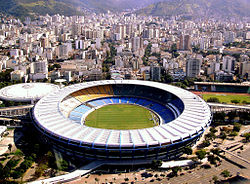| Event | 1963 Copa Libertadores | ||||||
|---|---|---|---|---|---|---|---|
| |||||||
| Santos won 4-0 on points. | |||||||
| First leg | |||||||
| |||||||
| Date | September 4, 1963 | ||||||
| Venue | Estádio do Maracanã, Rio de Janeiro | ||||||
| Referee | Marcel Albert Bois (France) | ||||||
| Attendance | 100,000 | ||||||
| Second leg | |||||||
| |||||||
| Date | September 11, 1963 | ||||||
| Venue | Boca Juniors, Buenos Aires | ||||||
| Referee | Marcel Albert Bois (France) | ||||||
| Attendance | 50,000 | ||||||
The 1963 Copa Libertadores finals was a football series between Santos and Boca Juniors on September 4 and September 11 of this same year. It was the fourth final of South America's most prestigious football competition, the Copa de Campeones (known in the modern era as "Copa Libertadores"). Defending champions Santos were appearing in their second consecutive final, whereas Boca Juniors were seeking to win the competition for the first time. Both finalists reached the final with relative ease as they crushed Botafogo and Peñarol.
Contents
Boca Juniors needed to win two group series to reach the finals. The Xeneixes progressed past the First round after winning three matches and losing only one, including a legendary 5-3 match against Olimpia which would repeat itself 26 editions later. As the defending champions, Santos begin their participation in the semifinals. [1]




